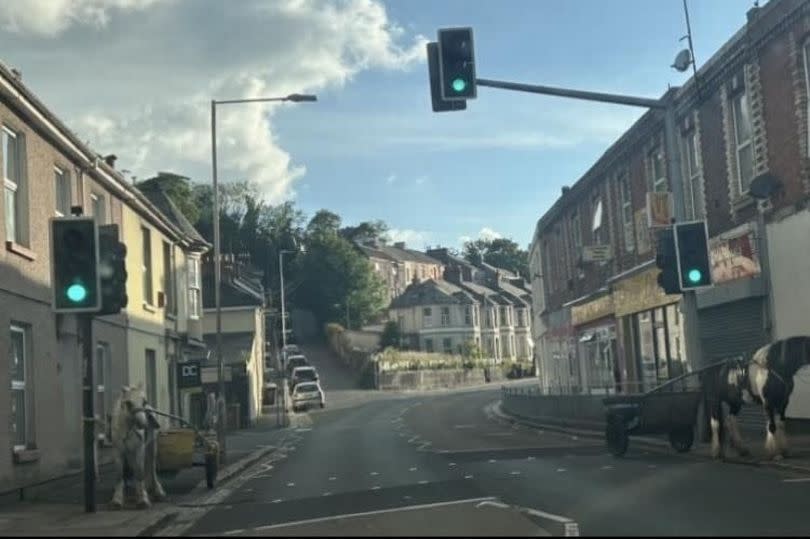Travellers' horses spotted on Plymouth's streets

Motorists were left dumbfounded to see two Traveller horse and traps by a pedestrian crossing on a Plymouth street. An image shows the two modes of transport by a row of terraced shops and homes in Percy Terrace, linking Alexandra Road.
Traditionally within the gypsy and Traveller culture, horse and traps are used for racing competitions and parades, although this is an increasingly rare occurrence on British streets not least due to the daily weight of traffic.
A passing driver who was left taken aback by the sight told PlymouthLive: "The travellers have taken over Trefusis park in Lipson. It seems their horses are on the loose. Here is an images of a couple of them on the bottom of Alexandra Road endangering the public and motorists and getting harmed themselves."
READ NEXT:
Weather alert for Plymouth Tom Jones show
Torpoint ferry delays warning as major works loom
Meanwhile, the unauthorised encampment at Central Park appears well established.
Another resident passing through the park this morning [Thursday] snatched a couple of photos of the large unauthorised encampment near the cafe. The images show around 10 caravans along with a number of vehicles, as well as the refuse and recycling bins provided by Plymouth City Council.

Council chiefs have said they were aware of two unauthorised encampments in Central Park and Trefusis Park and that staff had "reacted to both encampments as a matter of priority and as a result both sites" were served 24 hour Notice to Quit on Wednesday afternoon.
What is a Notice to Quit?
If the land is council owned, the council can issue a Notice to Quit. A Notice to Quit gives Travellers 48 hours to vacate the area.
If Travellers fails to do so, the council has authority to escalate proceedings and apply through the court to have the groups removed. If it is not council owned, it will be down to the landowner to take action.
What does the law say?
Travellers have been a part of British culture for hundreds of years. Councils across the UK have a duty of care to Travelling communities and all have designated areas where groups can stay.

The city council has a dedicated transit site called The Ride near Saltram, in Plympton, where Travellers can park caravans and have access to electrical power sockets and water. If an encampment is reported on public land or local parks, the council has to apply to the civil court for an eviction order.
If a camp is set up on private land it is the responsibility of the landowner to apply to the court for an order. In both cases it is down to bailiffs to enforce eviction orders and move Travellers on.
Police officers have no powers to remove Travellers unless they receive reports of "aggravating factors" such as disorder, antisocial behaviour, or crime. Plymouth police used Section 61 of the Criminal Justice and Public Order Act 1994 in June 2021 to order Travellers at St Mary's playing field in Plympton to leave the site or see their vehicles seized. It is believed to have been the first time Plymouth police made use of the legal power.
At the time Plymouth City Council was set to go to Plymouth County Court to secure a possession order, but police said they took action after receiving a number of reports from local residents regarding antisocial behaviour and criminal activity.
Click here to join PlymouthLive on WhatsApp and we'll send breaking news and top stories directly to your phone. We also treat our community members to special offers, promotions, and adverts from us and our partners. If you don’t like our community, you can check out any time you like. If you’re curious, you can read our Privacy Notice.

 Yahoo News
Yahoo News 
